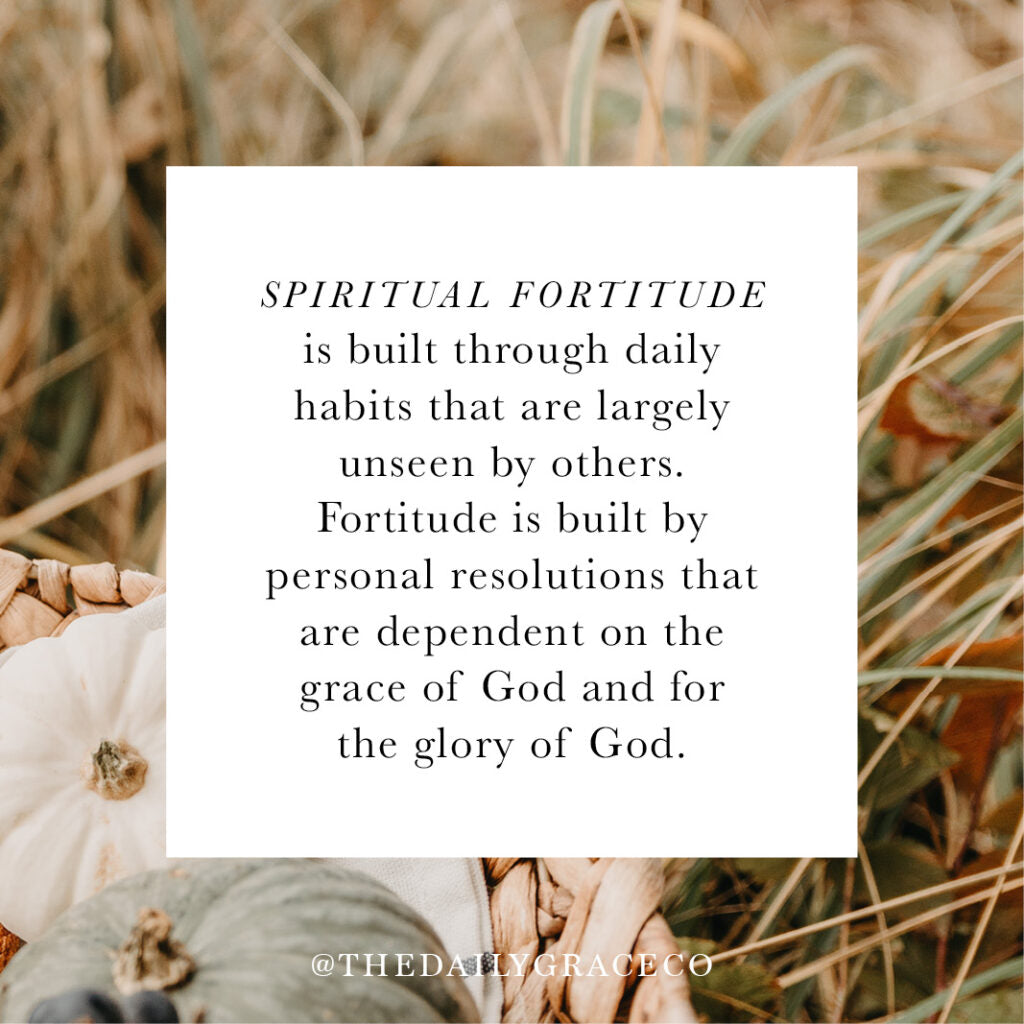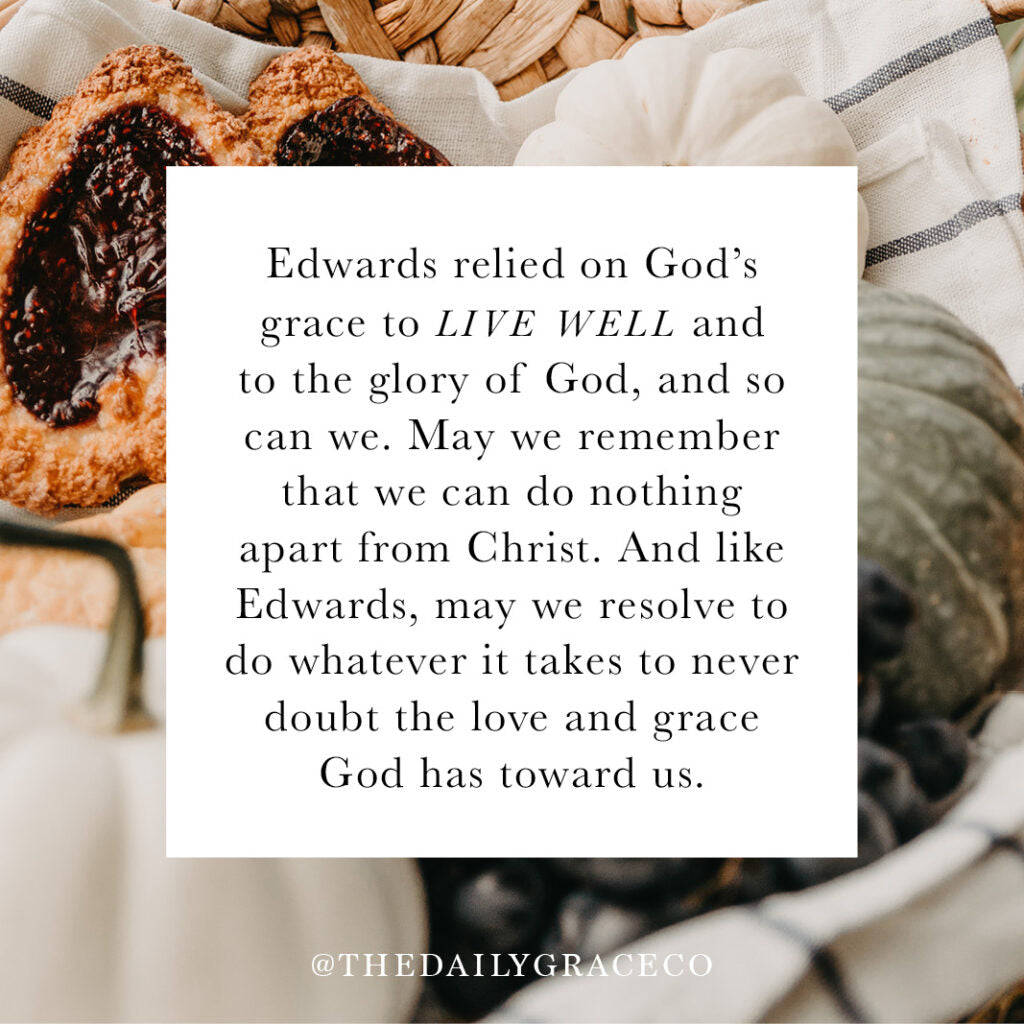How often are the New Year's resolutions we made at the beginning of the year at the forefront of our minds at the end of that same year? Do we even remember what we resolved to do? If you're anything like me, your New Year's resolutions were forgotten by March. More likely than not, one of the kids got sick in the height of winter and solid intentions to live every day purposefully and productively went out the window. If I'm honest, I give up far too easily. I get tired and lazy. I get busy and distracted.
Is there a way to live resolutely?
It seems a new list that changes every year depending on life seasons isn't working. Is it possible to have an unchanging list to carry us through the seasons? Jonathan Edwards was a pastor and theologian from the 1700s, and he had such a list. It was a list of 70 resolutions that was undeniable evidence that he approached life with an unwavering commitment to actually live every moment for the glory of God. It may have been a list that grew over time, but he resolved to read over the list every week. What difference would it make to read over our resolutions at least once a week!

These 70 resolutions encompassed his overall life mission and covered topics like time management; character; relationships and more. He wanted to live with all of his might. He wanted to use every moment productively for the glory of God. His measure of time worthy endeavors was this: "Resolved, never to do anything, which I should be afraid to do, if it were the last hour of my life". And "Resolved, never do anything, which I should be afraid to do, if I expected it would not be above an hour, before I should hear the last trump." Looking back at what you did the past hour of your life – would you have changed anything if you had any inkling that it would be your last? What things would you do differently if you lived like Jesus was going to return that very hour? Reading through Edwards' resolutions challenges me. You can't help but feel a sense of urgency. Your priorities are refined when put up against those measures.
These resolutions remind me that people are not respected as spiritual giants simply because they are fiery speakers or exceptional writers. These resolutions remind me that spiritual fortitude is built through daily habits that are largely unseen by others. Fortitude is built by personal resolutions that are dependent on the grace of God and for the glory of God. No one is exempt from the truth that daily habits shape us. Our private lives fuel our public lives. We cannot be effective in ministry if we're not personally rooted in the Word of God and in prayer. Substance cannot come from what is superficial.

The impact of Edwards' works have stood the test of time. Many well-respected pastors and theologians today consider the words penned by Edwards 250+ years ago to be most noteworthy. The late R.C. Sproul said this of Jonathan Edwards, "If someone were to ask who I thought was the most godly person that God ever gave to America, I would not hesitate to answer that question, 'Jonathan Edwards'. And if somebody asked me a different question and said to me, 'Well, who was the greatest preacher that ever preached in America?' I would say, 'Jonathan Edwards'. This high esteem for Edwards doesn't merely happen. In accordance with God's sovereign plan, Edwards was a man who loved God and led a life of resolve in response.
Twenty-one of Edwards' 70 resolutions were in relation to his spiritual life. Edwards was "resolved, to study the Scriptures so steadily, constantly, and frequently, as that
Edwards' resolutions also remind us that our confidence in Christ overflows to humility with others. Edwards was concerned with good works and people. Twelve out of his 70 resolutions were in regard to his relationships. He resolved to approach every person and interaction in a posture of humility. "Resolved, to act, in all respects, both speaking and doing, as if nobody had been so vile as I." How would our relationships and interactions with others be impacted by this resolution to see our own sins far clearer than anyone else's? Do we long to submit our emotions, thought life, and speech for the glory of God and the good of others enough to resolve daily to meet that end?
This kind of resolute life is impossible a part from Christ. Even Edwards knew this. He put this remark in his preamble: "Being sensible that I am unable to do anything without God's help, I do humbly entreat him by his grace to enable me to keep these Resolutions, so far as they are agreeable to his will, for Christ's sake". He relied on God's grace to live well and to the glory of God, and so can we. May we, like Edwards, remember that we can do nothing apart from Christ (John 15:5). And like Edwards, may we resolve to do whatever it takes to never doubt the love and grace God has toward us. May we resolve to remain assured of His grace and love for us. May we live as if we are "entirely and altogether God's".











